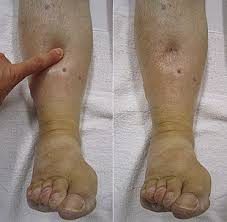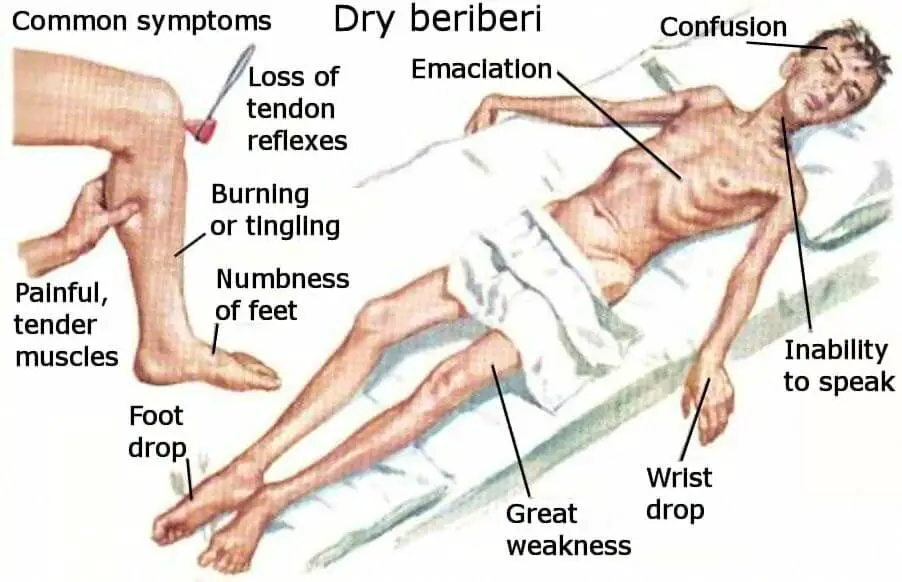Beriberi Overview
Beriberi: Overview, Types, Symptoms, and Prevention. Beriberi is a disease associated with a thiamine deficiency. Beriberi disease was common during the 1800’s and early 1900’s, especially in Asia, where polished rice was and continues to be the major staple of most diets. The role of a polished rice diet in causing beriberi was first described in the late 1800’s by Eijkman. Eijkman observed that chickens raised on a diet of refined rice developed acute head retraction that could be reversed by adding unrefined brown rice to the feed. This article will discuss the overview, types, symptoms, and prevention of beriberi.

Thiamine was first isolated in 1936. In the United States, because many companies now add thiamine to foods, beriberi is rare in the United States. Beriberi has had an increase in certain populations. These populations are refugees, alcoholics, and people who are malnourished in developing countries. There are two types of Beriberi.
What is Thiamine
Thiamine (B1) is an important vitamin that plays an important role in the cellular production of energy from ingested food. Thiamine is also important in the nervous system. Thiamine is on the eight essential B vitamins. B vitamins are essential for the proper functioning of the peripheral and nervous system. B vitamins help the body to convert carbohydrates, fat, and protein into energy.
Types of Beriberi:
Wet Beriberi
Wet beriberi is the type that affects the heart. Wet beriberi can manifest as congestive heart failure, shock, , metabolic acidosis, and renal failure.
Signs and symptoms of wet beriberi include:
- Peripheral swelling
- Shortness of breath
- Heart failure
- Enlarged heart
- Ankle swelling
- Nausea and upper abdominal pain
- Decreased urinary output

Dry Beriberi: Wernicke Encephalopathy and Korsakoff Syndrome
Wernicke Encephalopathy is a neurological disease resulting from thiamine deficiency with varied neurocognitive manifestations. It typically involves mental status changes and gait and oculomotor dysfunction.
Wernicke Encephalopathy Signs and Symptoms:
- Altered mental status
- Acute confusion
My Recommendations for Thiamine or B1 Deficiency
- Delirium
- Ataxia
- Memory disturbance
- Low temperature with low blood pressure
- Delirium tremors
- peripheral neuropathy
The treatment of Wernicke Encephalopathy is intravenous thiamine until the patient can resume a normal diet. After discharge, the patient should have daily oral thiamine (100 mg) on a long-term, outpatient basis. Alcoholics will commonly have this disorder and they will most likely be a deficiency in magnesium. Magnesium will need to be replaced because thiamine cannot be absorbed without magnesium.
Korsakoff Syndrome
Korsakoff syndrome is a chronic memory disorder caused by severe deficiency of thiamine (vitamin B-1). Korsakoff syndrome is most commonly caused by alcohol misuse, but certain other conditions also can cause the syndrome.
Korsakoff Syndrome Signs and Symptoms:
- Caused by alcohol misuse
- Inability to remember
- Confusion
- Staggering
- Lack of coordination
- Abnormal eye movements
The treatment for Korsakoff Syndrome is to give intravenous or injectable thiamine. Also to stop alcohol consumption if the person does use it.
Who is At Risk To Develop Beriberi:
- Pregnant women
- Alcoholics
- People who have had gastric bypass
- Babies who are breastfed
- Prolonged vomiting
- People with GI disorders such as Crohn’s disease
- Refugees who are malnourished
Thiamine Recommended Daily Amounts
Daily recommendations for thiamine intake for different age groups
| DEMOGRAPHICS | DAILY RECOMMENDED INTAKE (milligrams) | |
| UNITED STATES | CANADA | |
| 0–3 year(s) | 0.3–0.6 | 0.3–0.6 |
| 4–6 years | 0.9 | 0.7 |
| 7–10 years | 1 | 0.8–1.0 |
| >10 years (male) | 1.2–1.5 | 0.8–1.3 |
| >10 years (female) | 1–1.1 | 0.8–0.9 |
| Pregnant women | 1.5 | 0.9–1.0 |
| Breastfeeding women | 1.6 | 1–1.2 |
Thiamine Food Sources
- Beef, liver, poultry, and pork
- Nuts, oats, oranges, eggs
- Foods fortified with B1
- Rice, pasta, bread fortified with thiamine
- Legumes, and peas
Diagnosing Beriberi
Beriberi is diagnosed by measuring the level of thiamine in the blood. Sometimes providers will do a nerve biopsy. The only definitive treatment for beriberi is the rapid infusion of intravenous thiamine.
FAQ
Q: What is beriberi?
A: Beriberi is a nutritional disorder caused by a deficiency of thiamine (vitamin B1). It primarily affects the nervous system, cardiovascular system, and musculature. Thiamine is essential for the metabolism of carbohydrates and is necessary for proper functioning of the body’s cells.
Q: What are the symptoms of beriberi?
A: The symptoms of beriberi can vary depending on the type of beriberi (wet or dry) and the organs affected. Wet beriberi affects the cardiovascular system and can lead to symptoms such as rapid heart rate, shortness of breath, swelling of the lower legs, and fluid accumulation in the lungs. Dry beriberi affects the nervous system and can cause symptoms like muscle weakness, loss of coordination, tingling or numbness in the extremities, and difficulty walking.
Q: What is the connection between beriberi and the Philippines?
A: The Philippines has a historical association with beriberi due to the prevalence of the disease in the country during the early 20th century. Beriberi was a significant health problem in the Philippines, particularly among populations dependent on polished rice as a staple food. Polished rice lacks thiamine, as the outer layer containing this vitamin is removed during the milling process.
Q: How was beriberi addressed in the Philippines?
A: In the early 20th century, public health efforts were made in the Philippines to address the beriberi epidemic. It was discovered that the high consumption of polished rice was a contributing factor, as it lacked thiamine. This led to initiatives promoting the consumption of unpolished rice or the enrichment of polished rice with thiamine. The efforts to combat beriberi were successful, and the disease is now relatively rare in the Philippines.
Q: Is beriberi still a concern in the Philippines today?
A: Beriberi is no longer a major public health concern in the Philippines. The implementation of measures such as rice fortification and improved nutrition education has significantly reduced the prevalence of the disease. However, it’s important to maintain a balanced diet to ensure an adequate intake of thiamine and other essential nutrients.
